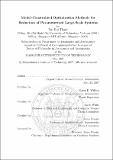Model-Constrained Optimization Methods for Reduction of Parameterized Large-Scale Systems
Author(s)
Tan, Bui-Thanh
DownloadACDL_TR-07-3.pdf (1.546Mb)
Metadata
Show full item recordAbstract
Most model reduction techniques employ a projection framework that utilizes a reduced-space basis. The basis is usually formed as the span of a set of solutions of the large-scale system, which are computed for selected values (samples) of input parameters and forcing inputs. In existing model reduction techniques, choosing where and how many samples to generate has been, in general, an ad-hoc process. A key challenge is therefore how to systematically sample the input space, which is of high dimension for many applications of interest.
This thesis proposes and analyzes a model-constrained greedy-based adaptive sampling approach in which the parametric input sampling problem is formulated as an optimization problem that targets an error estimation of reduced model output prediction. The method solves the optimization problem to find a locally-optimal point in parameter space where the error estimator is largest, updates the reduced basis with information at this optimal sample location, forms a new reduced model, and repeats the process. Therefore, we use a systematic, adaptive error metric based on the ability of the reduced-order model to capture the outputs of interest in order to choose the snapshot locations that are locally the worst case scenarios. The state-of-the-art subspace trust-region interior-reflective inexact Newton conjugate-gradient optimization solver is employed to solve the resulting greedy partial differential equation constrained optimization problem, giving a reduction methodology that is efficient for large-scale systems and scales well to high-dimensional input spaces.
The model-constrained adaptive sampling approach is applied to a steady thermal fin optimal design problem and to probabilistic analysis of geometric mistuning in turbomachinery. The method leads to reduced models that accurately represent the full large-scale systems over a wide range of parameter values in parametric spaces up to dimension 21.
Date issued
2007-05Publisher
Aerospace Computational Design Laboratory, Dept. of Aeronautics & Astronautics, Massachusetts Institute of Technology
Series/Report no.
ACDL Technical Reports;ACDL TR-07-3